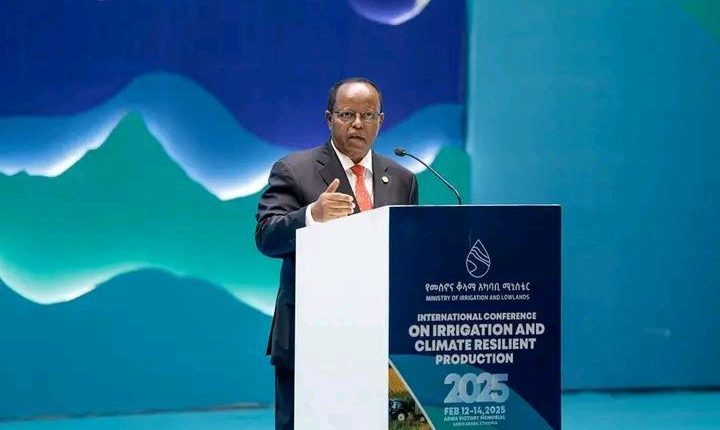President Taye says Ethiopia’s wheat self-sufficiency proves Africa can achieve food security
Addis Ababa, February 12, 2025 (FMC) – Ethiopia’s remarkable transition from a wheat-importing nation to self-sufficiency serves as a testament to Africa’s potential to achieve food security, President Taye Atske-Selassie asserted at the opening of the International Conference on Irrigation and Climate Resilient Production 2025 in Addis Ababa.

Scheduled for February 12 to 14th, the Conference was officially launched this morning, which brought together esteemed dignitaries, including ambassadors, representatives of international organizations, policymakers, and development partners, marking a significant milestone in advancing discussions on climate resilient production.
Addressing high-level dignitaries, including former African heads of state, ministers, and development partners, the President emphasized that with strategic investment in irrigation, mechanization, and sustainable farming, Africa can feed itself.
The opening of the conference, held at the Adwa Victory Memorial Museum, comes at a critical moment when climate change threatens food security across the continent. President Taye highlighted Ethiopia’s success in partnering with the African Development Bank (AfDB) to develop climate-resilient wheat varieties, which have transformed the nation into a self-sufficient wheat producer. “Africa can indeed feed itself. Ethiopia’s journey proves that with commitment, innovation, and strategic investment, we can secure our agricultural future,” he stated.
Central to this success is Ethiopia’s large-scale irrigation expansion. Over the past three decades, the country has invested heavily in modern irrigation infrastructure, turning once-barren landscapes into thriving agricultural zones.
Minister of Irrigation and Lowlands Abraham Belay reinforced this point, explaining how irrigation projects have revitalized agricultural production, empowered pastoral communities, and created job opportunities for women and youth. He urged African nations to adopt similar strategies, pointing to Morocco, India, Israel, and Australia as examples of how targeted irrigation policies can revolutionize food production.
President Taye also highlighted Ethiopia’s Green Legacy Initiative, which has seen the planting of over 40 billion trees. Beyond its environmental benefits, the initiative supports agroforestry, expanding food production while restoring ecosystems. In addition, the “Bounty of the Basket” (YeLemat Trufat) initiative is empowering Ethiopian communities to produce essential nutritious foods such as dairy, poultry, and honey, further reinforcing the nation’s food security agenda.
The president and the minister called for innovative financial models, including public-private partnerships, climate-resilient funds, and carbon financing, to mobilize resources for expanding irrigation systems.
“We need to think beyond aid and look at investment-driven agricultural transformation,” Minister Abraham asserted. “Irrigation is not a luxury; it is a necessity for Africa’s food sovereignty.”
Another critical challenge discussed was the need for reliable data in irrigation planning. Poor data quality has hindered evidence-based decision-making and limited development efforts. Minister Abraham called for increased investment in technology, data collection, and digital literacy to ensure that irrigation expansion is based on accurate information and long-term sustainability.

As the three-day conference unfolds, Ethiopia is positioning itself as a continental leader in climate-resilient agriculture. President Taye closed his remarks with a call to action: “We must scale up our successes, collaborate across borders, and invest in the infrastructure and technology needed to build a food-secure Africa. Ethiopia has shown what is possible—now, it is time for the rest of Africa to follow.”
With Ethiopia’s model serving as proof that self-sufficiency is achievable, the conference is expected to shape policy discussions on the future of irrigation and food security across Africa. The nation’s bold initiatives offer a blueprint for other African countries looking to combat climate change and secure their agricultural future through strategic irrigation and innovation.

The conference is particularly significant for Ethiopia as it provides an opportunity to learn from global best practices and apply these lessons to local context, the minister added.
By drawing on international experiences, Ethiopia can enhance its irrigation strategies, improve water use efficiency, and build resilience against the diverse effects of climate change, it was indicated.
According to the Ministry of Irrigation and Lowlands, the conference will also explore innovative financing mechanisms that prioritize inclusivity, ensuring that women, youth, and marginalized communities are actively involved in and benefit from irrigation development efforts.


